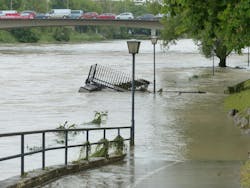FEMA names first communities for targeted assistance on hazards resilience
FEMA recently unveiled the initial designation of 483 census tracts that will be eligible for increased federal support to boost resilience to natural hazards and extreme weather.
The action was the result of bipartisan legislation, the Community Disaster Resilience Zones Act of 2022. The law aims to help localities most at risk from the impacts of climate change to build resilience to natural hazards.
The legislation provides federal agencies with additional funds for projects in designated zones. The zone designations can also help the private sector, nonprofits, philanthropies, and other non-federal partners target investments in community resilience, according to a FEMA news release.
The designations cover all 50 states and the District of Columbia, and can be explored on an interactive map on FEMA’s website. The designations take into account socioeconomic status, household characteristics, house type, and transportation themes from the Centers for Disease Control and Prevention’s Social Vulnerability Index.
More zone designations will be released over the next 12 to 18 months based on updates to the National Risk Index, lessons learned from the first designations, and stakeholder input. Planned updates to the National Risk Index include additional data on tsunami and riverine flood risk.
